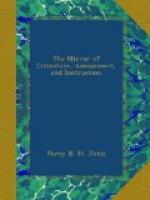On Thursday evening, the 24th of October, eleven days before the intended meeting of Parliament, an anonymous letter was put into the hands of the servant of Lord Monteagle, warning his Lordship not to attend the Parliament that season, for that God and man had concurred to punish the wickedness of the times. It is a most extraordinary fact, that the conspirators knew of the delivery of this letter to the Lord Monteagle, and that it was in the possession of the Earl of Salisbury, Secretary of State, for eight days before the disclosure took place, as developed in Thomas Wintour’s confession, taken before the Lord’s Commissioners on the 23rd of November, 1605; yet so strong was their infatuation, and so desperately had they set their fortunes on the event, that they unanimously resolved “to abyde the uttermost tryall.”
The generally received opinion has been, that it was to the sagacity and penetration of King James that the detection of the conspiracy must be ascribed, and that it was his Majesty who first suggested the agency of gunpowder: but the Earl of Salisbury, in a letter to Sir Charles Cornwallis, ambassador at Madrid, asserts, that in a conversation between the Earl of Suffolk (Lord Chamberlain) and himself, on perusal of the anonymous letter, the employment of gunpowder first occurred to them, and that the King subsequently concurred in their opinion. The letter, after having been communicated to several of the Privy Council, was shewn to the King three or four days before the opening of Parliament, who, with great prudence, gave orders that no notice whatever should be taken of it, but that every thing should go on as usual, until the very day appointed. On Saturday, the Lord Chamberlain, according to the customary forms of his office previous to the meeting of every Parliament, viewed every room and cellar belonging to the Parliament House, and amongst others the identical vault in which the wood and powder was deposited, and observed a man, who subsequently proved to be Guy Fawkes, standing there to answer any questions that might have been asked. The Lord Chamberlain then went to the Privy Council and reported what he had seen. After much discussion it was resolved that a more minute search should be made, under pretence of seeking for stolen goods, in order that no suspicion might arise if nothing should be discovered. Accordingly, on Monday at midnight, Sir T. Knyvett, accompanied by a small band of men, went to Percy’s house, where, at the door, they found Guy Fawkes with his clothes and boots on. Sir Thomas immediately apprehended him, and then proceeded to search the house and vault, and upon removing some of the wood, they soon discovered the powder ready prepared for the explosion; then, directly afterwards, searching Guy Fawkes, they found on him three matches and other instruments for setting fire to the train. He confessed himself guilty, and boldly declared, that if he had happened to have been within the house when Sir T. Knyvett apprehended him, he would instantly have blown him up, house and all.




